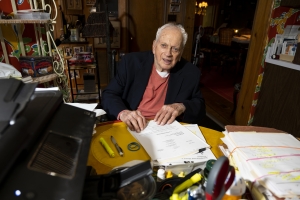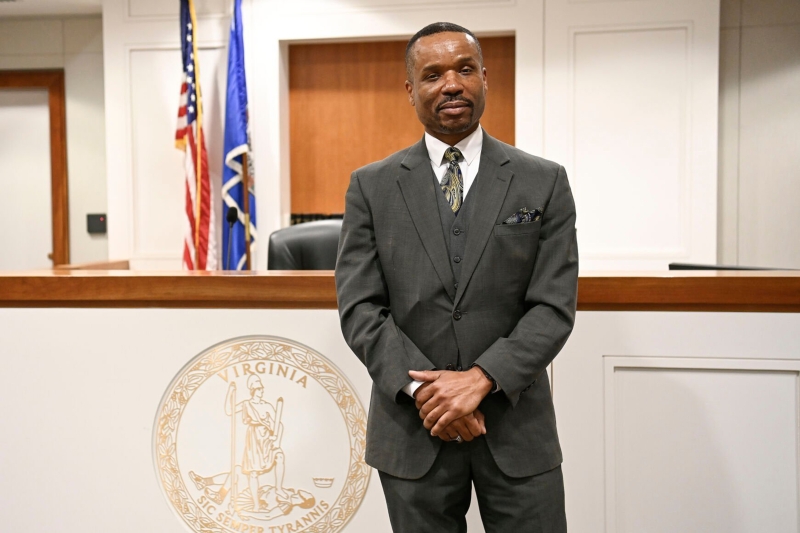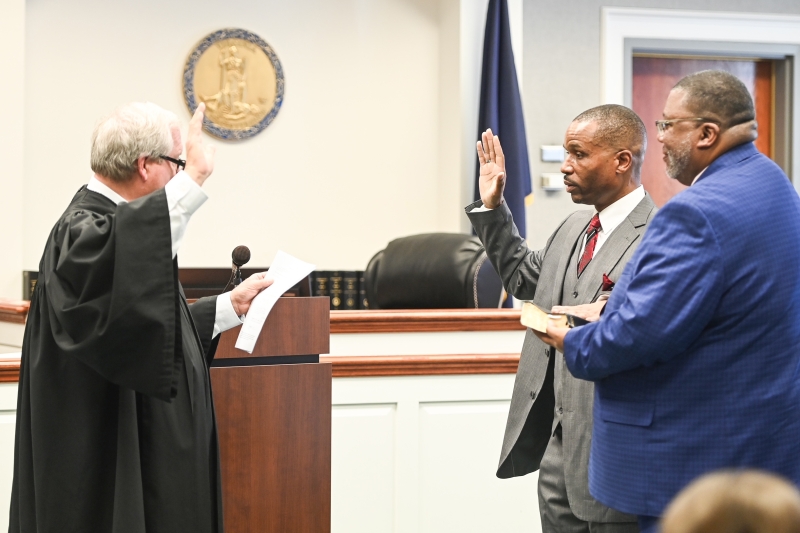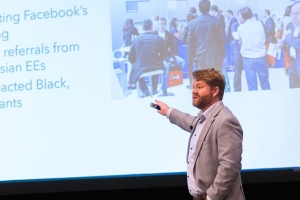
Alumni Spotlight: Eugene Butler ’98L is Making a Difference Last year, Butler became the first Black judge in Virginia’s 24th District.
Eugene Butler ’98L was a teenager growing up in Roanoke when he set his sights on becoming a lawyer. The law, he thought, would afford him an opportunity to help people.
Then he told his grandmother his plans.
“And my grandmother, God rest her soul, said, ‘Baby, why do you want to be a lawyer? All they do is lie.’” Butler said. “And I was like, ‘Wow. I don’t want to do that. I don’t want to lie.’”
But rather than dissuading him, his grandmother’s admonition about lying lawyers strengthened his desire to pursue the law.
“What she said created this kind of ambition in me to be not just a lawyer, but to be a good lawyer,” said Butler. “My father was a Methodist minister; my mother was a high school teacher. They were the first generation of college students on both sides of their families. They’d always pushed us to good deeds, to make a difference.”
Butler is working to make a difference as a juvenile and domestic relations judge for Virginia’s 24th Judicial District, which encompasses the city of Lynchburg and the counties of Amherst, Bedford, Campbell, and Nelson. When the Virginia General Assembly elected him this past February, Butler made history by becoming the first Black judge in the 24th district.
When Butler reflects on the historic significance of his election, he said he is less interested in being the first Black judge and more interested in not being the last. That’s the same way he felt about getting to law school.
“There were no lawyers in my family. I chose the road less traveled, and it wasn’t always easy,” Butler said. “But I figured that if I can do this, then I might be able to make it easier for those who came after me.”
After Butler earned his bachelor’s degree in political science from Randolph-Macon College, he chose W&L Law where he hoped to get the same small classes, close community, and personal attention he’d had at RMC. Furthermore, Butler’s family was now living in Lexington since his father had become minister of Randolph Street United Methodist Church four years earlier. Consequently, Butler found community not only inside the law school but also in the wider Lexington community because of his parents’ presence.
“I became a kind of local guide for classmates since so many of them were new to Virginia and Lexington, and I knew my way around,” Butler said. “What I remember most about W&L was the students’ camaraderie. There was a deep sense of community, which was punctuated by lots of lively discussions.”
In his 1L year, Butler recalled, many of the liveliest discussions happened in the Lewis Hall hallways and centered on the O.J. Simpson trial, which was wrapping up in Los Angeles that fall.
“It was an interesting time to be starting law school,” Butler said. “Here we are trying to develop that lawyer mindset, and so much of the talk was about the Simpson case. When the verdict came down, it led to some interesting conversations, let me tell you.”
In addition, one of Butler’s favorite courses was Constitutional Law because classroom discussions, especially when the Commerce Clause was the subject, were every bit as passionate as those hallway arguments about the Simpson’s innocence or guilt. What Butler found particularly valuable about the give-and-take was the breadth of opinions because of what he described as a “smorgasbord of different people with different experiences.”
“I was one of those students who’d gone straight through — high school, undergrad, law school,” Butler said. “All I’d ever known was school. At W&L, I was among a lot of folks who’d been out working, professional women and men. It made for a well-rounded experience.”
After W&L, Butler interviewed at several firms before joining an insurance defense firm in Alexandria, Virginia. “All due respect to anybody who does insurance defense, but it was very boring,” he said.
A W&L classmate, Lisa Woods Vogel, rescued him by suggesting he move to Lynchburg, where she was practicing and where Butler’s father was now preaching at Jackson Street Methodist Church. He took her suggestion and put out his shingle. He took on a variety of court-appointed cases, which included serving as guardian ad litem.
Then, in 2006, he joined the child support section of the Virginia Attorney General’s office as an assistant attorney general. He worked in 10 courts and routinely handled between 200 and 250 cases a month, though each case may have lasted only five to 10 to 15 minutes. He worked in that capacity for 13 years before getting an assignment as a substitute JDR court judge in 2021 and was then elected to his judgeship in 2023.
“I was not surprised that Eugene was elected to the bench,” said Aaron Boone, Lynchburg public defender. “Regrettably, it took much longer than it should have. I’ve known Eugene for 20 years and have had a front row seat to watching his ascendancy. There is nobody who is more qualified and even-handed than Eugene.”
Boone and others who have watched Butler at work over the years believe he has not only the right temperament for a judge but that he is also suited for the sorts of cases he adjudicates in the JDR court.
“You are dealing with heartbreaking stories,” said Boone. “It takes a tremendous amount of fortitude and a great deal of compassion. That’s Eugene’s strength.”
Mary Chamberlin, an attorney for Petty, Livingston, Dawson and Richards, agrees with Boone’s assessment. She said that Butler, who served as president of the Lynchburg Bar Association from 2019 to 2020, has been a mentor to her and other younger members of the bar association.
“In JDR Court, emotions can, and often do, run really high. It’s a high conflict environment, but all the strengths Eugene had as a lawyer, he displays on the bench,” she said. “He has both the knowledge and experience to rule on cases effectively, but he also has the demeanor that allows litigants, lawyers, witnesses, and other stakeholders to feel heard and respected during a trial. His calm nature and his unfailing kindness have made him an asset to the community.”
One thing Butler quickly learned about the JDR court is that issues are rarely black and white. Instead, matters are almost always gray — “completely gray,” he said. A great many of the cases that come before Butler are, as both Boone and Chamberlin acknowledged, highly charged and often heartbreaking.
“It is the type of court where you have to prepare yourself for disappointment,” Butler said. “I had no illusion that there were any easy answers. A lot of judges, if they don’t know that, they’ll get burned out just like that.”
Yet, this is precisely where Butler believes he should be, where he can fulfill his ambition to make a difference.
“I know that, for a lot of people, JDR would be their last choice for a judgeship,” Butler said. “Yes, I’m dealing with a whole lot of personal problems, terrible situations, horrific stuff. But I felt that this is the court where I could make the biggest impact.
“The foundation my parents gave me makes me believe, that when it comes to these juveniles and families and what they’re dealing with, that it doesn’t have to be this way,” Butler said. “Having two parents who are on meth or living in a household with domestic abuse — that’s not everybody’s reality. It doesn’t have to be like that.”
And as the first Black judge in the district, his very presence symbolizes change. When he saw the smiles on so many faces at his investiture, Butler realized that his addition to the bench was a moment of pride for the community.
“I had to step back and realize this is bigger than just me because I’m an old introvert,” Butler said. “I’m not interested in getting a lot of pats on the back. But I will say that if my presence makes someone else think that they can do it, too, then that’s a good thing.”
If you know any W&L alumni who would be great profile subjects, tell us about them! Nominate them for a web profile.
 Eugene Butler ’98L
Eugene Butler ’98L Eugene Butler being sworn in at the Amherst County Courthouse
Eugene Butler being sworn in at the Amherst County Courthouse


You must be logged in to post a comment.